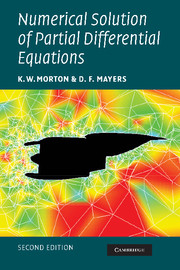Book contents
- Frontmatter
- Contents
- Preface to the first edition
- Preface to the second edition
- 1 Introduction
- 2 Parabolic equations in one space variable
- 3 2-D and 3-D parabolic equations
- 4 Hyperbolic equations in one space dimension
- 5 Consistency, convergence and stability
- 6 Linear second order elliptic equations in two dimensions
- 7 Iterative solution of linear algebraic equations
- References
- Index
- Numerical Solution of Partial Differential Equations
5 - Consistency, convergence and stability
Published online by Cambridge University Press: 05 September 2012
- Frontmatter
- Contents
- Preface to the first edition
- Preface to the second edition
- 1 Introduction
- 2 Parabolic equations in one space variable
- 3 2-D and 3-D parabolic equations
- 4 Hyperbolic equations in one space dimension
- 5 Consistency, convergence and stability
- 6 Linear second order elliptic equations in two dimensions
- 7 Iterative solution of linear algebraic equations
- References
- Index
- Numerical Solution of Partial Differential Equations
Summary
Definition of the problems considered
In this chapter we shall gather together and formalise definitions that we have introduced in earlier chapters. This will enable us to state and prove the main part of the key Lax Equivalence Theorem. For simplicity we will not aim at full generality but our definitions and arguments will be consistent with those used in a more general treatment.
In the problems which we shall consider, we make the following assumptions:
the region Ω is a fixed bounded open region in a space which may have one, two, three or more dimensions, with co-ordinates which may be Cartesian (x, y, …), cylindrical polar, spherical polar, etc.;
the region Ω has boundary ∂Ω;
the required solution is a function u of the space variables, and of t, defined on Ω × [0, tF]; this function may be vector-valued, so that our discussion can be applied to systems of differential equations, as well as to single equations;
the operator L(·) involves the partial derivatives of u in the space variables; L does not involve t explicitly; for the most part we shall assume that L is a linear operator, but whenever possible we shall give definitions and state results which will generalise as easily as possible to nonlinear operators;
the boundary conditions will prescribe the values of g(u) on some or all of the boundary Ω, where g(·) is an operator which may involve spatial partial derivatives;
the initial condition prescribes the value of u for t = 0 over the region Ω.
- Type
- Chapter
- Information
- Numerical Solution of Partial Differential EquationsAn Introduction, pp. 151 - 193Publisher: Cambridge University PressPrint publication year: 2005
- 1
- Cited by



